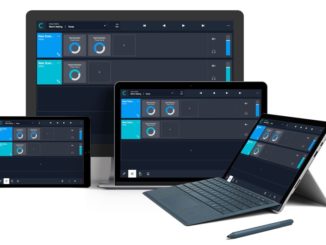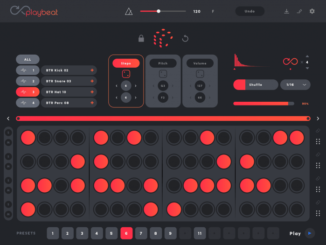Congburn Stacks is a fun groovebox plugin powered by a 4-track granular looper and a polysynth for macOS, Windows, and iOS.
Great news from Congburn: the granular looping groovebox Stacks is now available for iOS for $19,99 on the Apple AppStore.
Article From July 14, 2024
Strokes by developer John Howes, aka Congburn, is one of the most comprehensive cross-platform software grooveboxes on the market. With advanced synthesis, sampling capabilities, and sequencing, it offers plenty of creative freedom to the user.
John Howes remains at grooveboxing with Stacks, his third release.
Congburn Stacks
Stacks is also a feature-packed groovebox, but it explores other sonic areas. This is mainly due to the different engines and concepts.
While Strokes focused on MIDI sequencing, Stacks relied on audio looping on four tracks. You can record three distinct sound sources into it: the internal polysynth, external audio, or resampling the app’s output.
Sound Engine & Signal Path
The synthesis part is built around a four-voice polyphonic Synthesizer with two-dimensional wavetable morphing, four FM modes, a sub-oscillator, and a unison option.
A neat option is the ability to route the polysynth, the external signal, and resampling through the same signal chain, so you can shape all signals with the same tools. This starts with a bit-crusher, followed by a versatile filter section with three modes.
It includes dual highpass/lowpass, variable width bandpass, and a six-bandpass filter bank. It’s n(o)ice to see that there is also love for filter banks. You don’t see them enough in software, either.
A comprehensive modulation engine is also onboard. The main is more West Coast-ish inspired. Stacks archives more organic sounds by using a lowpass gate emulation in addition to its clean VCA variant.
Next, it hosts six chaos generators/LFOs, a mod sequencer, per-stage parameter locks, and an AD envelope. All this manages a powerful 24×115 modulation matrix. That should be enough mod power.
To refine your sounds, it hosts saturation, chorus, stereo, and ping-pong delays with a frequency shifter in the feedback path and two reverb types (algorithmic and convolution). Straight MIDI input or the built-in polyrhythmic sequencer with ratcheting and chord options let you play the synth as you like.
Granular Loopers
Attention, it’s going to get a bit more exciting. The sound sources can then be recorded in four independent looper tracks. Each looper is also a granular processor that is fully controllable with various parameters: size, seek, scan, spray, pitch, and more. Plus, it’s synced with your DAW’s clock.
First Impression
Stacks looks like a lot of fun. I like that the signal path is very adaptable; therefore, you can shape the synths and sampling to the same extent. The UI is packed with features, so you’ll need a little time to understand everything. Once you get into the groove, I’m sure there’s much possible here.
And the granular add-on in the looper section makes it also a groovebox with a different touch. More experimental than classic boxes.
Congburn Stacks is available now for an introductory price of £35 instead of £49 in early access. It runs as a VST3 and AU plugin on macOS (native Apple Silicon + Intel) and Windows. The iOS version with AUv3 plugin support is out now for £19,99.
More information here: Congburn





Is this the Octatrack killer? Did anybody use both long enough to compare?
long enough?, this “app” is out for 24h! So probably not, and hardware vs software is difficult to compare.
Octatrack is a sampling workstation with fine control over all parts while this goes in a different direction: a wavetable synth or audio that goes through a granular looper.
20 bucks c’mon no brainer